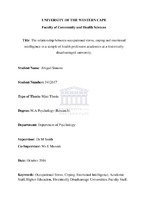| dc.description.abstract | Academe is no longer a low stress profession caused by the changing nature of academic work. Academics in health professions perceived a considerable degree of pressure related to the many roles they need to assume such as, teaching, administration, research, and community service. In addition, they are expected to continue practicing in their profession. Research has identified the key stressors experienced by academics, have recorded the debilitating effects of occupational stress and have emphasised that stress left unmanaged can result in burnout. However, such studies on academic well-being and occupational stress are lacking within the South African context. Similarly, studies into the coping strategies used by academic staff and the impact of emotional intelligence on stress and coping remain a focus for further research. Therefore, the overall aim of this study was to determine the relationship between occupational stress, coping and emotional intelligence among academic staff in health professions at a historically disadvantaged university. The study used an online survey design and the sampling frame comprised of all academic staff in a Faculty of Community and Health Sciences at a historically disadvantaged university. Descriptive statistics, correlation matrices and multiple regressions were used to analyse the data. Ethics clearance was obtained from the relevant university committee, and consent to conduct the study at the identified institution was given by the Registrar. As evidenced by the results, significant associations emerged between occupational stress, coping and emotional intelligence. Emotional intelligence was identified as an essential factor that can predict the subjective well-being among academics. | en_US |

